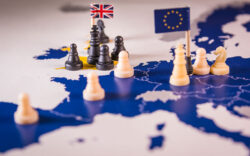- Smugglers demanding “no taxation without representation”…?
- Did EU farmers really think they could get paid to go fallow forever?
- It’s competition they fear, not climate legislation
On 16 December 1773, a suspiciously organised rabble of Americans dressed as Mohawk Indians dumped 342 chests of British East India Company tea into Boston Harbor. The question we are dealing with today is why.
They weren’t doing it to add salt to the tea, as one American has suggested doing more recently. The so-called scientist almost sparked a re-run of the Revolutionary War that followed the Boston Tea Party with her recommendation.
No, the Boston Tea Party was all about, “No taxation without representation!”
At least, that’s the schoolboy version. And I should know, having gone to American schools in England and Germany. At one point, they even made me recite the Pledge of Allegiance – a declaration of loyalty to the American flag. Not that I knew what a “legiance” was at the time, having just left a struggling new school in Limerick, Ireland…
Anyway, the Americans’ story goes that a bunch of patriotically minded protestors decided to dump the tea to protest that they had to pay tax on it.
Except, of course, that they didn’t. In fact, they were protesting precisely the opposite – the lack of taxes to be paid on the tea they were dumping.
This might seem odd, but there’s another side to the whole Boston Tea Party story. One that might radically reshape your perception of recent news coming out of Brussels, Paris, Portugal, Spain, Italy, Eastern Europe and a rather long list of other places in Europe where farmers have taken to the streets to protest.
Not all protagonists at the Boston Tea Party were “Sons of Liberty” – motivated by a political revolt about taxes. Some just wanted to make a living off the government… by smuggling.
This might seem like an odd claim too, but any smuggler will tell you that it’s government taxes that make a smuggler’s market. We have cigarette smugglers today because of the eye-watering taxes on cigarettes, for example. Without taxes, smugglers are out of a job.
It was the same before the Boston Tea Party. The taxes levied on the colonies just created a business opportunity. Smugglers could buy tea from the Dutch, secretly import it duty-free and sell it below the market price of taxed tea.
Unfortunately, the British government decided to remove taxes on tea imported by the British East India Company specifically.
On the one hand, giving the British East India Company such a tax advantage is deeply unfair. And you might think that’s why the Americans were protesting. Indeed, that would be another more flattering account of what happened in Boston… “Through political skullduggery, the British East India Company had gained an unfair advantage and was able to undercut American merchants. So the British tea deserved to be in the drink. Huzzah!”
Fair enough – I’d support that version of events. But the truth seems to be a little different…
A key sentiment leading to the Boston Tea Party was that smugglers had been put out of a job by the tax changes. Their tax-free smuggled tea, supplied by the Dutch in what was known as the Dutch Trade, could not compete with legal tax-free tea imported by the British East India Company.
And so the smugglers spat the dummy and staged a tea party at the British East India Company’s expense.
This means that a key reason for the Boston Tea Party was removing taxes – the very opposite of what American schoolchildren and any long-suffering foreign students among them learn about.
The thing is, I can smell the same deception again today when it comes to the Brussels Manure Party. Farmers are protesting across Europe, spraying manure over roads and buildings. But I suspect their anger is being misunderstood in much the same way that we misunderstand the Boston Tea Party.
Those protestors with their tractors – what’s really motivating them? What’ll get them off the streets?
Is this really about climate change legislation? Is it about too much red tape? Is it withdrawing subsidies for agricultural diesel?
I doubt it.
Here’s what I think: after many decades of such coddling treatment, it’d make a wind-farm developer blush, these agricultural dependents have spat the dummy at the idea of being treated like the rest of us.
No more diesel subsidies?
No more money for fallow land?
No more subsidies?
How unfair!
The EU’s farmers are protesting because they are no longer the political elite’s favourites. After decades of a common agricultural policy that put farmers in the front carriage of the EU gravy train, farmers are protesting because “their” governments have dumped them for a new interest group: the climate lobby.
And hell hath no fury like a subsidised industry spurned.
Of course, they have a point. It’s just not the one they’re actually making in public.
Our society and economy are so clogged with government regulations, taxes and costs that we also need subsidies, grants and exemptions just to get anything off the ground anymore.
That is how governments control our societies today. They squeeze the entrepreneurial spirit out of us with impossible burdens that nobody even understands and then permit the industries they support with relief from those burdens.
This also means that any reform of those systems triggers precisely the chaos we’re seeing. Their dependents rely on them.
Just as in the run-up to the Boston Tea Party, the issue is that the government is constantly mucking around with our lives, deciding which livelihood lives and which dies. Its subsidies decide which businesses thrive and which get strangled with red tape.
Their taxes go up and go down, get selectively applied to various products but not others, and exemptions get granted to some but not others. It’s complete and unnavigable chaos that turns protesting for political favours into good business sense.
The fact that farmers, chemical companies, car companies and others have fallen out of favour as wind energy and nuclear power become more popular is just the flavour of the month. This is really about how much the government intervenes in our lives and constantly changes the rules.
It was the same back in the late 1700s. Here’s a summary of the lead-up to the Boston Tea Party from a museum. It reads almost exactly like chaotic EU policies today:
Since the beginning of the 18th century, tea had been regularly imported to the American colonies. By the time of the Boston Tea Party, it has been estimated American colonists drank approximately 1.2 million pounds of tea each year.
Britain realized it could make even more money off of the lucrative tea trade by imposing taxes onto the American colonies. In effect, the cost of British tea became high, and, in response, American colonists began a very lucrative industry of smuggling tea from the Dutch and other European markets. These smuggling operations violated the Navigation Acts which had been in place since the middle of the 17th century. The smuggling of tea was undercutting the lucrative British tea trade.
In response to the smuggling, in 1767 Parliament passed the Indemnity Act, which repealed the tax on tea and made British tea the same price as the Dutch. The Indemnity Act greatly cut down on American tea smuggling, but later in 1767 a new tax on tea was put in place by the Townshend Revenue Act. The act also taxed glass, lead, oil, paint, and paper. Due to boycotts and protests, the Townshend Revenue Act taxes on all commodities except tea were repealed in 1770.
In 1773, the Tea Act was passed and granted the British East India Company a monopoly on tea sales in the American colonies. The smuggling of tea grew rampant and was a lucrative business venture for American colonists, such as John Hancock and Samuel Adams. The Townshend Revenue Act tea tax remained in place despite proposals to have it waived.
American colonists were outraged over the tea tax. They believed the Tea Act was a tactic to gain colonial support for the tax already enforced. The direct sale of tea by agents of the British East India Company to the American colonies undercut the business of colonial merchants. The smuggled tea became more expensive than the British East India Company tea.
Smugglers like John Hancock and Samuel Adams were trying to protect their economic interests by opposing the Tea Act, and Samuel Adams sold the opposition of British tea to the Patriots on the pretext of the abolishment of human rights by being taxed without representation.
What a mess, just like the EU’s policies. One minute they’re subsidising diesel because of climate change, and the next they are taxing it. Of course, people reliant on diesel are protesting. They were made dependent on it.
The farmers of today understand that their protests are part of the bargaining process of interest groups to get money off the government. They also know that the costs and inconveniences imposed on them benefit their industry by making it more difficult to enter, which prevents competition.
Notice how the smugglers in Boston actually wanted the taxes they were supposedly protesting against. What they objected to is getting rid of them for the British East India Company. They couldn’t handle the competition.
I suspect it’s much the same in the EU as well. The EU has made it impossible to farm economically. Energy policy, agricultural policy, industrial policy, climate change policy and plenty more are on the list. And so foreign competition is lining up to supply cheap food.
Sure, the EU legislation is stupid. But who do you think has been lobbying for much of it to keep out competitors? The farmers have – that’s how we ended up with the common agricultural policy in the first place.
The real issue is that nobody outside the EU is dumb enough to come up with the same awful rules. And that has made their agriculture better and cheaper than Europe’s.
The real give-away is the solutions being proposed to get the farmers off the streets. It isn’t to repeal the bad legislation. It’s to prevent external competition that is exempt from the same rules.
In his general policy speech at the National Assembly on Tuesday, French Prime Minister Gabriel Attal didn’t announce he’d be rolling back climate legislation, diesel policy or bureaucratic red tape. He said this: “The goal is clear: guaranteeing fair competition, especially so that regulations that are being applied to [French] farmers are also respected by foreign products.”
That is what the farmers want: their share of handouts and protectionism. After all, taxation begets representation and farmers know to vote.
Attal also promised exemptions from EU fallow-land requirements, just as the British East India Company got exemptions from taxes on tea… selective favours needed by industries to survive.
So, will the Brussels Manure Party of 2024 change much? Is this the high-water mark for environmental legislation coming out of the EU?
Don’t hold your breath. After all, the Tax Day Tea Party protests of 2009 didn’t achieve much in the end either.
This is really just a play for higher subsidies and more protectionism from the government. The farmers’ protests are a marketing scheme for their true clients – European politicians.
That said, net zero’s true reckoning is coming. But this is what it could look like.
Until next time,

Nick Hubble
Editor, Fortune & Freedom



